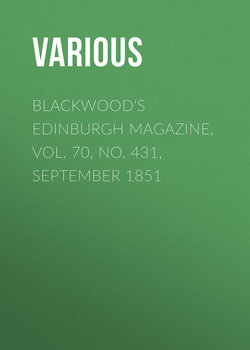Читать книгу Blackwood's Edinburgh Magazine, Vol. 70, No. 431, September 1851 - Various - Страница 8
MY NOVEL; OR, VARIETIES IN ENGLISH LIFE
CHAPTER VII
ОглавлениеSuddenly one morning, as Leonard sate with Barley, a fashionable cabriolet, with a very handsome horse, stopped at the door – a loud knock – a quick step on the stairs, and Randal Leslie entered. Leonard recognised him, and started. Randal glanced at him in surprise, and then, with a tact that showed he had already learned to profit by London life, after shaking hands with Burley, approached, and said with some successful attempt at ease, "Unless I am not mistaken, sir, we have met before. If you remember me, I hope all boyish quarrels are forgotten?"
Leonard bowed, and his heart was still good enough to be softened.
"Where could you two ever have met?" asked Burley.
"In a village green, and in single combat," answered Randal, smiling; and he told the story of the Battle of the Stocks, with a well-bred jest on himself. Burley laughed at the story. "But," said he, when this laugh was over, "my young friend had better have remained guardian of the village stocks, than come to London in search of such fortune as lies at the bottom of an inkhorn."
"Ah," said Randal, with the secret contempt which men elaborately cultivated are apt to feel for those who seek to educate themselves – "ah, you make literature your calling, sir? At what school did you conceive a taste for letters? – not very common at our great public schools."
"I am at school now for the first time," answered Leonard, drily.
"Experience is the best schoolmistress," said Burley; "and that was the maxim of Goethe, who had book-learning enough, in all conscience."
Randal slightly shrugged his shoulders, and, without wasting another thought on Leonard, peasant-born and self-taught, took his seat, and began to talk to Burley upon a political question, which made then the war-cry between the two great Parliamentary parties. It was a subject in which Burley showed much general knowledge; and Randal, seeming to differ from him, drew forth alike his information and his argumentative powers. The conversation lasted more than an hour.
"I can't quite agree with you," said Randal, taking his leave; "but you must allow me to call again – will the same hour to-morrow suit you?"
"Yes," said Burley.
Away went the young man in his cabriolet. Leonard watched him from the window.
For five days, consecutively, did Randal call and discuss the question in all its bearings; and Burley, after the second day, got interested in the matter, looked up his authorities – refreshed his memory – and even spent an hour or two in the Library of the British Museum.
By the fifth day, Burley had really exhausted all that could well be said on his side of the question.
Leonard, during these colloquies, had sate apart, seemingly absorbed in reading, and secretly stung by Randal's disregard of his presence. For indeed that young man, in his superb self-esteem, and in the absorption of his ambitious projects, scarce felt even curiosity as to Leonard's rise above his earlier station, and looked on him as a mere journeyman of Burley's. But the self-taught are keen and quick observers. And Leonard had remarked, that Randal seemed more as one playing a part for some private purpose, than arguing in earnest; and that, when he rose and said, "Mr Burley, you have convinced me," it was not with the modesty of a sincere reasoner, but the triumph of one who has gained his end. But so struck, meanwhile, was our unheeded and silent listener, with Burley's power of generalisation, and the wide surface over which his information extended, that when Randal left the room the boy looked at the slovenly purposeless man, and said aloud – "True; knowledge is not
